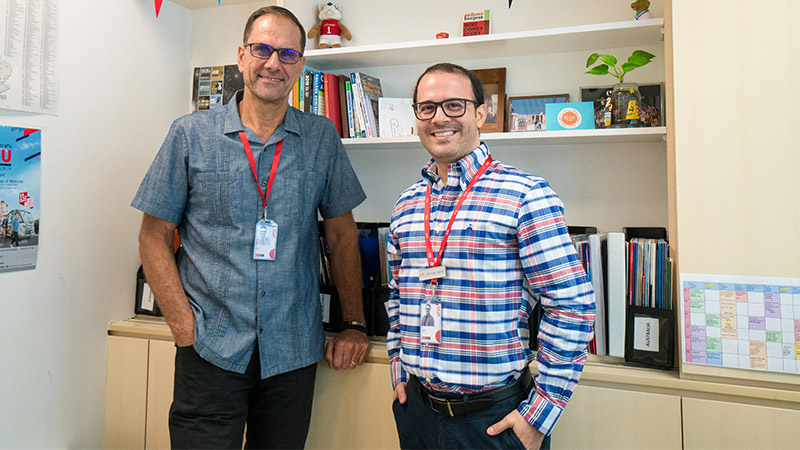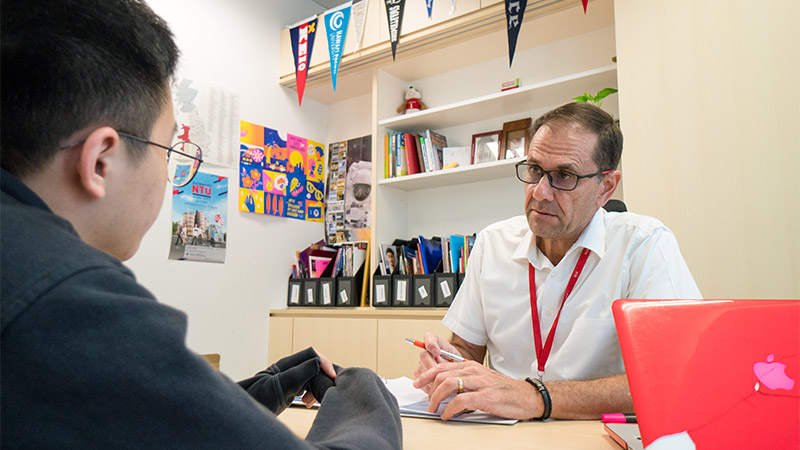Schools help students prepare to head to university. How about some advice for Mum and Dad? Canadian International School (CIS) university advisors KEMAL TASKIN and CHRISTIAN YANEZ answer three key questions for parents.
Part 1: The Application Process
Why is parental support important during the university application process?
Applying to universities is an overwhelming process for many students. For some students, it’s the first major decision in their lives. Reassurance and advice from parents can ease their children’s nervousness about the application process and the huge transition ahead.

How can parents help – and what are some of the common pitfalls to avoid?
It’s critical for parents to have honest conversations with their child about which schools are feasible – both academically for the student and financially for the family. They can also help by attending campus visits and university open days with their child. This is a great way to generate honest conversations about whether the university meets their child’s academic and personal needs. We also advise parents to be fully supportive even when the goals and aspirations of their child don’t align with their own. It’s important that the university applicant makes their own decision – with your guidance – to allow them to reach their full potential.
What should parents expect from school career advisors ?
At CIS, we guide our students with career development and exploration through online assessment resources and experiential learning. Through this process, they begin to discover their interests and strengths. As advisors, we talk with them one-to-one to help them define a passion or area of interest.
Regarding applying to universities, we provide clear guidelines and timelines from the moment students begin to research options. We continue to provide support through the application process and ultimately up until the moment they choose the university that best fits their needs.

Part 2: Results Day
When acceptance and rejection letters start to arrive, follow these guidelines:
Dos:
• Have conversations about “what ifs” prior to reading the results. It’s a good idea to have a Plan B (or C and D) in place so that children and parents have a clear plan in place no matter the outcome.
• Reassure your child that their “backup university” is going to work out just fine.
• Together with your child, read the book Where You Go Is Not Who You’ll Be by New York Times columnist Frank Bruni. This will put the whole university experience into a healthy, realistic perspective.
• Share any personal stories that you may have regarding rejection. Normalise it in the sense that these things, though difficult, are a normal part of life.
Don’ts:
• Avoid well-meaning but clichéd advice like “It just wasn’t meant to be” or “Maybe it’s destiny?” Although your child may end up feeling this way later on, it’s not helpful in the moment.
• Don’t make your child feel bad or guilty about not hitting the mark. Anything even remotely related to “You could have…” or “You should have…” is forbidden.
Part 3: The Empty Nest
They did it! University classes start tomorrow. But what about you? Here is how JACQUIE WEBER, a former CIS mum, coped when three of her children left home at the same time. I thought I was prepared when my 18-year-old triplets left Singapore to attend university in the United States. After all, isn’t this a measure of success – a sign we prepared them for the world? In reality, there are many unique challenges you just can’t prepare for when your teenager moves 15,000 kilometres away.
When your child heads off to university, the sense of loss can feel unbearable, particularly when they are on a different continent. Frankly, my parenting style made the transition more difficult. While trying to be a supportive, positive parent, I often found myself slipping into the role of helicopter parent while they were in high school. One child has a chronic medical condition and another has a learning disability. I was used to helping them with their schedules and smoothing the path ahead. How would they manage without me?

Fortunately, planning ahead can help you (and your children) cope with this new stage of parenthood. Start early and help your kids learn basic skills. Many expat families are blessed with helpers, which means many teenagers don’t know how to cook, do laundry or clean a bathroom. It’s never too late to learn. We had a lot of laughs the day they each learned to iron a shirt. They initially thought it was silly – until the competition became fierce!
Use social media to your advantage. Join the parents’ Facebook page at your child’s university. It’s a great way to learn about the campus and the community. Several members of the parent group at my daughter’s university live close to the school and occasionally post photos of campus events. It’s also helpful to know there’s someone local I can call in an emergency.
Once your child has started classes, communication is key. Give your child space to become independent, but regular check-ins are also healthy. Don’t be surprised when lengthy texts in September dwindle to weekly emojis by December as they make friends and juggle courses.
Although it may be a cliché, staying busy really does help. Children take up an awful lot of time. Give yourself permission to feel sad, then fill up your free time with projects that mean something to you.
Be prepared for that phone call. The adjustment to university can be difficult for students. They may call to tell you they are miserable, hate school, are overwhelmed academically, have no friends and want to come home. As parents, we naturally want to make things better for our children and it feels so much worse when you are far away. But try not to panic! Understand that this call may be a normal part of the adjustment process. Being prepared for the situation, while hoping that it never arises, helps. Be positive and encourage them to reach out for help on campus.
This month marks the fourth year since I said goodbye to my children and sent them off to university in another country. It gets easier every year, and the time between visits seems to get shorter and shorter. It seems as though the house has just quietened down before they are back for a school break and the whirlwind begins again. Don’t tell them, but I’m secretly beginning to enjoy the quiet…
CIS is at 7 Jurong West Street 41 and 371 Tanjong Katong Road.
6734 8088 | cis.edu.sg
See more in our school section
International schools in Singapore: HUGE GUIDE
How to choose an international school
This article first appeared in the November 2019 edition of Expat Living. You can purchase a copy or subscribe so you never miss an issue!



